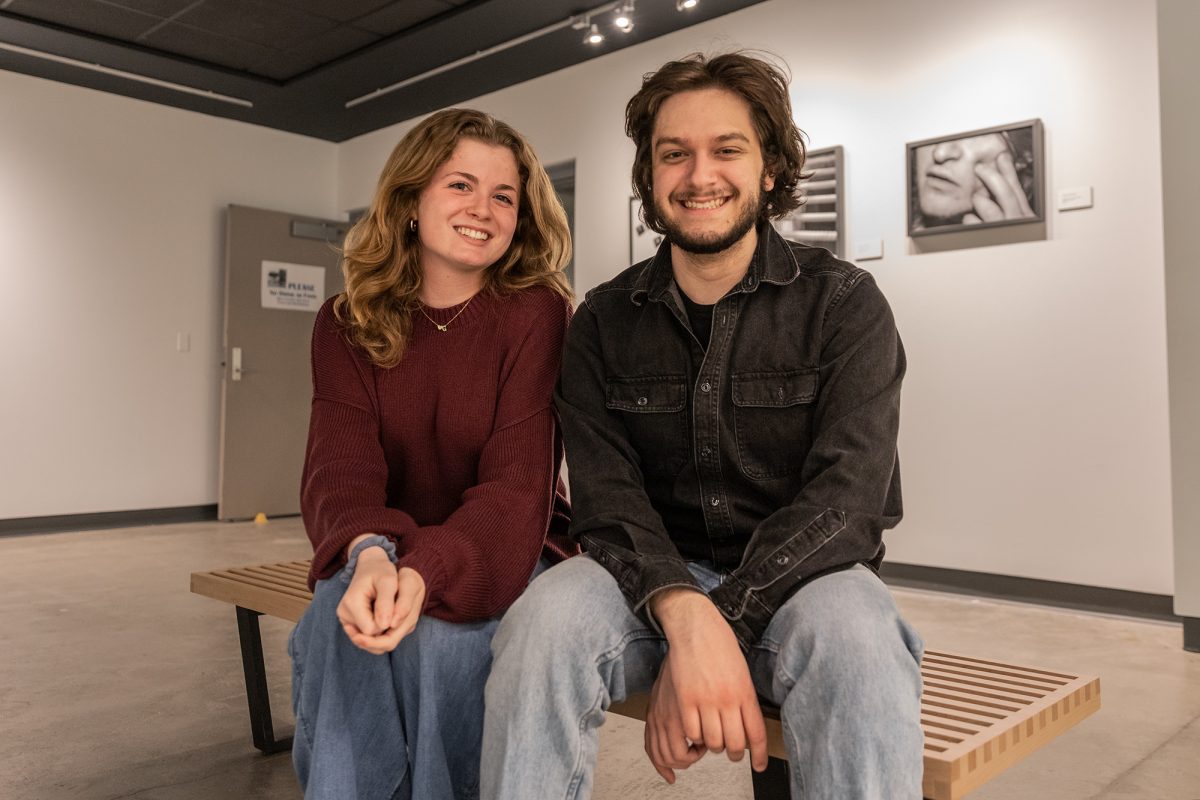
Kai Lincke
From left, Grace Ann Mattair and Sam Zaslow-Braverman are the first and second place winners, respectively, of the David R. Ames Film Award. Their films use kaleidoscopes as the central theme.
Each year since 2007, Ithaca College’s Roy H. Park School of Communications holds the David R. Ames Film Award to recognize student scriptwriters and filmmakers across a range of disciplines. With the support of David R. Ames ’72 the award offers $5,000 for first and second place winners to produce their script into a short film.
By winning the award, recipients are enrolled in a minicourse that allows them to check out equipment from PPECS. For many students, the competition is a chance to get hands-on experience through the whole process of creating a film and bringing it to audiences.
Before students get started, they must pitch their script to a committee of faculty judges. Each script must fall between eight and 15 pages to be considered. Along with the script, a production proposal and a potential production team that fulfills all key crew positions is also needed.
Nick Bennett, assistant professor in Media Arts, Sciences, and Studies, has served as a committee member since 2023. He teaches courses like Screenwriting, Writing for Video Games and Emerging Media, Structuring the Feature Film and Writing the Feature Film and works as a screenwriting coach for the winners.
“I love being part of a competition that rewards screenwriting and development at its core,” Bennett said. “We don’t judge the final product of the produced film; we judge the screenplays and pitches before the films are made. This focus centers the importance of good writing and encourages applicants to improve their screenwriting skills.”
According to Bennett, there was no theme last year and the committee received fewer than 10 submissions. This year, the committee chose the theme “kaleidoscope,” which was left open-ended for writers to explore within their scripts. The committee received 20 submissions — some included the kaleidoscope as a physical object or prop used by characters, while others went in an abstract direction and incorporated the theme as symbolism through colors and patterns as metaphors for anxiety, identity or loss.
The two winning scripts were shot over spring break, from March 8-16.
Sophomore Graceann Mattair, a writing for film, TV, and emerging media major, was the first-place winner of the David R. Ames Film Award for her script, titled “Moving Parts.” Once Mattair was chosen as a finalist, she created a pitch deck to present to the panelists, including an essay about her vision for the project, script revisions, a casting plan, a potential crew and production schedule.
“I had never done an actual pitch before — it was [a] really cool experience to get this early on,” Mattair said. “I wrote it, and I get to direct it as well, which is super exciting, and then learn about the whole production process with the others I’m working with.”
The plot follows a young girl named Lucy who struggles to leave her childhood home when her family decides to move, which Mattair said was based on personal experience. For her script, Mattair aimed to have the main character be younger, so she looked at films like “Little Miss Sunshine.” She said she was shocked to be a finalist for the award and is excited to be able to see the final product.
“To be able to see my own writing come to life for the first time is something I’m so grateful for, and really really pumped about,” Mattair said.
“Moving Parts” is currently in post-production and will be completed by May 6. Mattair said she plans to submit to film festivals in the summer, but does not yet have any specific ones in mind.
The second-place winner, Sophomore Sam Zaslow-Braverman, is a film major minoring in audio production and writing for film, TV, and emerging media. Zaslow-Braverman became a finalist for his script titled “Resurrection” about a funeral home that can bring people back for three minutes and “eulogize” themselves. The script started out as a comedy but as time went on, Zaslow-Braverman found that it became increasingly deeper. Drawing from personal experiences, Zaslow-Braverman wrote “Resurrection” after losing his great aunt at the beginning of the pandemic.
Zaslow-Braverman attributed much of his initial interest and success in scriptwriting to a teacher at his local community outreach center in seventh grade.
“The teacher there actually took me under her wing,” Zaslow-Braverman said. “She passed away a little while ago from cancer. It’s kind of a very tragic thing. And Suzanne Hevner, if you ever want to look her up, she was [an actor] on ‘Master of None’. At one point, she really laid the foundation for how to write comedy and from there, writing comedy and writing sad [stories].”
For Zaslow-Braverman, he aims to have his film completed in early May as well. He says he plans to submit to bigger film festivals like Tribeca and South by Southwest. Additionally, he plans to submit to smaller, regional festivals, including the Montclair Emerging Filmmaker Competition.
“Resurrection is something that I’ve been really passionate about for a long time,” Zaslow-Braverman said. “It’s kind of been like a white whale for me for a very long time, and eventually I want to turn it into a feature. But for now, I’m gonna be happy to just have a solid, finished piece of filmmaking.”